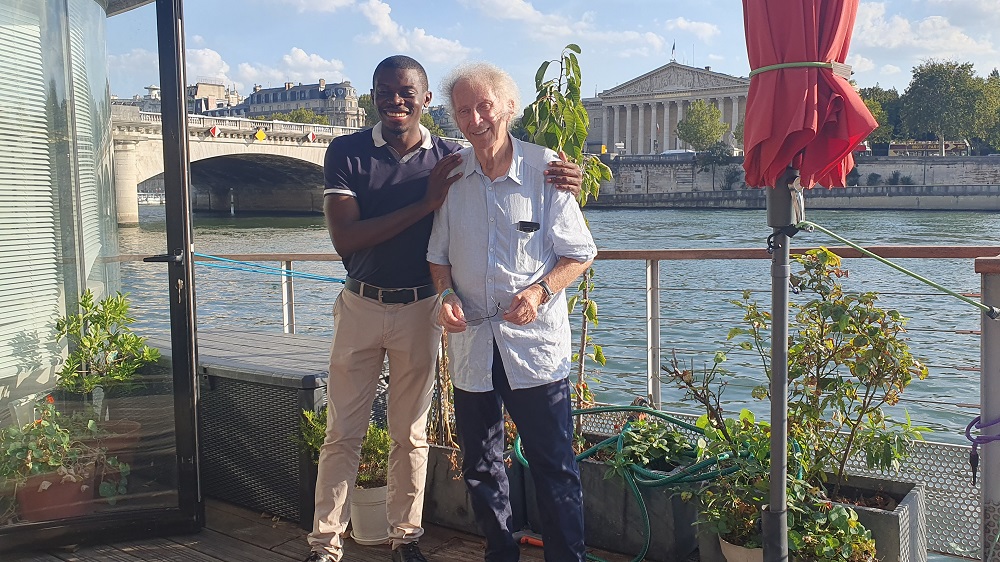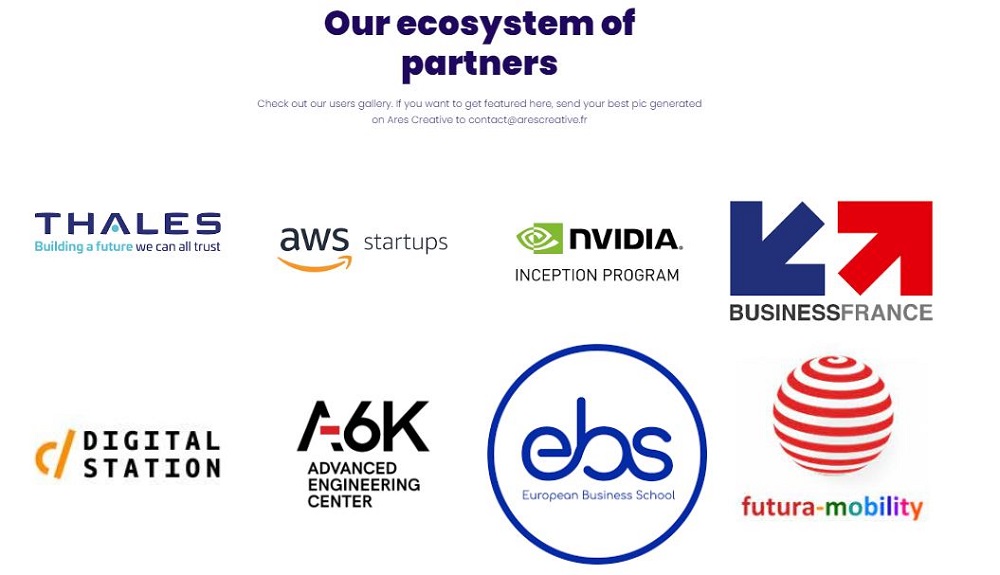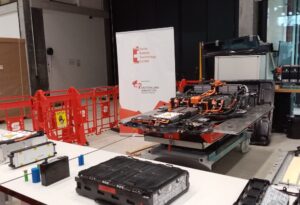William Elong, Faraday Lab: for a European AI to rival ChatGPT
William Elong, Faraday Lab: for a European AI to rival ChatGPT
Five years after his first meeting with Futura-Mobility, William Elong is once again welcomed by the think tank in September 2023 to present Faraday Lab, the company he has set up to develop the artificial intelligence (AI) ARES Chat, a European AI to rival ChatGPT.
A graduate of the French School of Economic Warfare (École de guerre économique) and a successful Cameroonian entrepreneur (Will & Brothers, Algo Drone), William Elong is ranked by Forbes among the top, most influential, young African leaders.

Futura-Mobility: Why did you go into creating a generative AI?
William Elong: Firstly we said to ourselves, “why doesn’t anyone create a browser other than Chrome or Edge?” It’s open source, so technically should be feasible. We often heard a lot of talk that it would take hundreds of millions of euros to make one… we did our beta in just 10 days!
We then got the idea of making this browser intelligent. All the companies everyone knows, like Microsoft, have started integrating generative AI into their browsers. The future of the browser is an intelligent one that will translate your YouTube videos, create real-time content… that’s where we’re heading.
To make the browser intelligent, we created a module. At first, it was just an extension for our browser, but over time, this AI became a product. Today, with no advertising, no marketing, and a team of 8, we’ve gained 40,000 users in 3 months in 30 countries, just by engaging in forums and through word of mouth within the geek community.
So we started out by developing a web browser, then when developing an integrated AI we realised the market opportunities for a chatbot. So the browser in still in beta whereas we have worked massively on our AI.
FM: How did you create ARES Chat in such a short space of time?
WE: We started with existing, high-performing open-source models like Bloom from the French National Centre for Scientific Research (Centre national de la recherche scientifique, CNRS) or Falcon 40B from the Technology Innovation Institute in the United Arab Emirates, and even LLAMA 2 from META. We then improved them by focusing on the user interface and language capabilities, especially in French, so that anyone, without specific knowledge or coding skills, can interact with our AI.
Furthermore, we have used many open-source code components available on the market for our core architecture, including tools published by Hugging Face.
FM: Tell us about ARES Chat, its strengths and market positioning…
WE: With our ARES Chat model, which runs thanks to our models called ARIA, you can generate emails, code… everything you’re used to doing with your regular chat. It supports around 40 languages. We have added a multimodal dimension so that everything happens on the same interface. There is a button that allows you to generate both text and images simultaneously. We are a direct competitor of ChatGPT.
Our strategy is to provide high-performing chatbots, developed at controlled costs and tailored to the specific needs of the client company within a maximum timeframe of 15 days. We want to emerge more quickly than our European competitors. We’re selling our speed, efficiency, and the ability to produce without too much metaphysics.
Working with major players like Nvidia, Reply, and Amazon has given us a huge boost in terms of efficiency and results, strongly positioning our ARIA models on the global Hugging Face Leaderboard, which compiles most open-source models and their scores. Collaboration with these three major groups has given us access to cloud-based, AI customisation infrastructure (Amazon Sagemaker), graphics cards (Nvidia), and solid AI expertise (Reply’s AI experts).
FM: Where do you stand on the issue of sovereignty?
WE: In development but available in Beta, our European sovereign internet browser includes ARES Chat, communication security by Thales (Citadel), data storage in Europe, and plenty of integrated open-source content.
The fact remains that the most widely used web browsers, Chrome, Edge, and Firefox, are American, and the Patriot Act exists…. So your banking data, history, and bookmarks, are in a tool over which you have virtually no control. By using the same Chromium-based foundation as Chrome, we were able to create a beta version of our own browser.
In addition to the strategic autonomy it will provide for the European Union and its member states, due to its many offline uses, this browser is particularly appealing for countries in Africa, the Middle East, Latin America and the Caribbean.
I believe France has the skills and assets to build its digital sovereignty in the field of generative AI. We’ve seen CNRS publish Bloom, for example, which had capabilities comparable to ChatGPT, but the solution remains largely unknown to the general public because there is no simple and user-friendly interface using it easily. That said, building digital sovereignty calls for a business approach. Creating exceptional solutions in laboratories is good, but successfully selling them to clients with a need is even better. The gap between research and the economic reality of the market is what is hindering France’s progress in this area. A pragmatic approach is needed, moving away from administrative processes that take months, especially in markets with technologies that evolve literally every 15 days, like the field of generative AI field.
FM: What is your business model?
WE: There are two schools of thought. Either you want to reinvent everything, or you use what already exists. In the first, startups and researchers start out by raising money to potentially create a model in 2024. In the second, entrepreneurs like me create their models immediately using what is already to hand, seek clients to make profits, and reinvest them in R&D. We have chosen the latter development model at Faraday Lab and fully assume it.
We have three business approaches for three target audiences:
- Firstly, Ares Chat is free for the general public, with the option of a Pro subscription at €20/month for additional features.
- Secondly, for businesses, we directly market our ARIA models via an API invoiced by request.
- Finally, for governments and big businesses, we offer customised models based on their own data, hosted on their own servers. This value proposition provides a cybersecurity dimension and approach that our main competitors don’t offer. With this model we cover the B2C, B2B, and B2G markets.
On one hand, you have start-ups each raising over 100 million euros based solely on the CVs of their founders, yet without any product, claiming they might have efficient Foundation models by the end of 2024. In parallel, we are active in the market right from the start with functional models and solutions, admittedly with room for improvement, but at least they exist. I AM NOT starting from scratch so we don’t need huge initial capital. It’s a different approach: I start with what exists, improve and optimise it, create something that works, seek clients, and develop our position in the market, all the while bearing in mind the idea of eventually creating our own Foundation models to avoid dependency on Meta, Falcon, and so forth. I’m doing both in parallel. You can do research and business simultaneously.
FM: What are your goals for 2023 and beyond?
WE: ARES Chat is already installed with clients from various sectors (governmen, public, corporate). Our ARIA models are already deployed in over 400 projects worldwide from our Hugging Face account. Eventually, we aim to create our foundation models. This will enable us to refine their features based on user feedback, including feedback on languages, for instance. On this basis, we aim to strengthen its market position and international focus to achieve European leadership position. This will give us the resources needed to create proprietary models that will be even more innovative.
We aim to become a global leader, nothing more, nothing less. Right now, we are actively joining consortia with major open-source players in France and already have technical support from the world’s best graphics card company, Nvidia, the world’s leading cloud provider, AWS, and one of Europe’s top AI companies, Reply. So there is no objective reason not to be ambitious and aim for the top spot. Our models are already ranked among the best on the Hugging Face Leaderboard, and our goal is to take first place. Llama 2 was trained on limited French data, like many other open-source models from the United States. We are compensating for this linguistic gap and bringing our own fine-tuning methodology to the table.

FM: In your view, what questions does using AI raise in general?
WE: We need to consider the ideological issue of data and the algorithms used. If you ask a model like ChatGPT a question about family or geopolitics, for instance, the answer it provides today is culturally oriented and tends to be European or North American in nature. But there are other schools of thought in the world! So AIs must be trained on all these different datasets. There are many different perceptions of morality and life. Artificial intelligence should reflect these differences. Yet the opposite is happening…. A group of American stakeholders is imposing their logic and perhaps even their legislation.
Europe can be more than just a regulator and become a player. Artificial intelligence raises serious ethical questions. In the field of drones, which I’m familiar with, there’s the question of killer robots and the level of autonomy granted to a drone tasked with striking a target. Today, technically, almost anything is possible, without venturing into the realm of science fiction since humans still retain control. The rest is a matter of political and military decision making.
Another issue, the European AI Act, which is expected to come into effect in 2024, must not stifle innovation by creating what is known as ‘regulatory capture’. This is a classic tactic used by major players and especially American start-ups. After raising funds, they use fear tactics to influence laws and establish legal frameworks that become entry barriers for their competitors. Let’s not be naive in France and Europe. We need to regulate AI, but we need to do it intelligently.
In conclusion, I believe artificial intelligence is the greatest revolution of this new millennium and nations worldwide must seize the opportunity. It would be counterproductive to let the world develop into a situation where we have to choose between American AI or Chinese AI. There is a third way and we intend to create it. Young entrepreneurs need to realise that open source is a weapon for breaking down entry barriers and building communities of talent. The AI revolution will inevitably involve an open approach.


